第二章 翻译技巧:词法翻译法
英译中技巧

英译中翻译技巧一、翻译总的原则1. 表达应建立在理解的基础上。
2.翻译时既要忠实于原文,又要符合汉语的习惯。
3.翻译不可太拘泥于原文的形式。
二、翻译技巧1.词法翻译1.1增词译法为使译文在语法、语言形式上符合译文习惯和在文化背景、词语联想方面与原文一致起来,使得译文在与原文在内容、形式和精神等三方面都对等起来,需在原文的基础上添加必要的词、词组、分句或完整句。
e.g. 1) They were frank and candid with each other in a relaxed way.译文:他们相互之间开诚布公、直言不讳而且气氛十分轻松。
2)Suppose the preparatory work should not be completed.译文:准备工作完成不了,那可怎么办?3)Our rushing is understandable, but costly.译文:人们的忙碌是可以理解的,但是为此付出的代价却是昂贵的。
试比较:1) 他喜欢指出别人的缺点,但用意是好的。
译文:He likes to point out other people’s shortcomin gs, but he means well.(增加主语)2)屋里准有人,我听见有人声。
译文:There must be someone in the room, for I heard a voice. (增加连接词)说明:增词译法在英译汉中主要是添加原文中虽无形式却意在其中的成分;在汉译英中一般是增添原文中为了语言简洁而被省去的成分如,主语、宾语、物主代词、连接词、介词等1.2减词译法就是把原文中需要的译文中不需要的词、词组等在翻译时加以省略,以适应译文语法和习惯表达法的需要。
e.g. 1)One must make painstaking effort before one could succeed in mastering a foreign language.(省略主语)译文:要掌握一门外语,非下苦功不可。
unit 2 词汇翻译 2
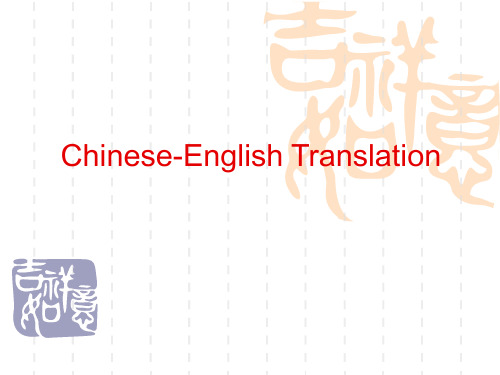
春节,又称农历新年,它是中国最重大的传统节 日。时间通常在一月底,二月初,象征着一年辛 劳后,冬春之交的休息和放松,也象征了喜庆。 The Spring Festival, also known as the Lunar New Year, is the greatest traditional festival. It is usually a time between late January or early February, which means rest and relaxation between winter and spring after a year’s toil, and means celebration as well.
春节前,人们打扫屋子、在大门上贴大红对联、 放鞭炮。据传说,这样做是为了驱赶一个叫“年 ”的魔鬼。除夕之夜,一大家子定会在一起会餐 ,最受欢迎的主食是饺子,人们认为它能带来好 运吉祥。 Before the Spring Festival, people clean their houses, put red couplets on their gates, and set off firecrackers, according to fairy tales, for driving a demon named Nian away. On the eve of the Spring Festival, a gettogether banquet is a must, and the most popular food is Jiaozi, which is supposed to bring good fortune.
1) 减省语气助词 汉译英时语气助词多半要省略。 真的呢,再没有比这种童子面更好看的茶花了。(杨朔,《 茶花赋》) It’s true. No flowers are lovelier than children’s faces. 我想到李白杜甫在那遥远的年代,以一叶扁舟搏浪急进,该 是多么雄伟的搏斗,会激发诗人多少瑰丽的诗思啊!(刘白 羽,《长江三日》) This makes me think of the poets Li Bai and Du Fu in those ancient days when they sailed upstream against the current and how such a magnificent struggle would stir the poets’ great imagination.
第二章 练习答案 词法翻译的一般技巧
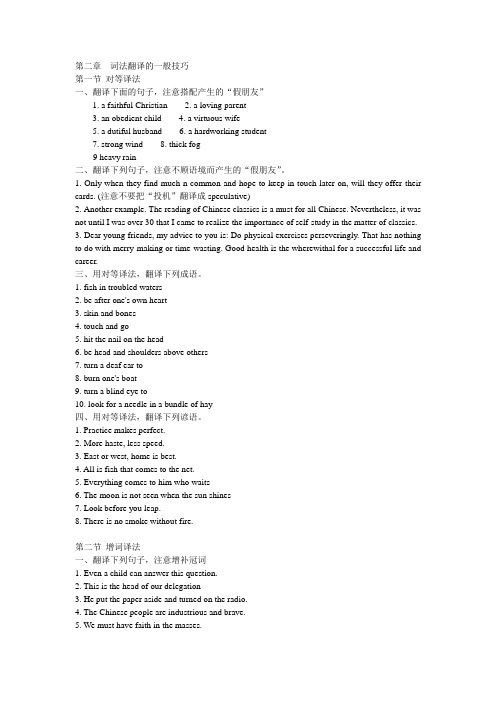
第二章词法翻译的一般技巧第一节对等译法一、翻译下面的句子,注意搭配产生的“假朋友”1. a faithful Christian2. a loving parent3. an obedient child4. a virtuous wife5. a dutiful husband6. a hardworking student7. strong wind 8. thick fog9 heavy rain二、翻译下列句子,注意不顾语境而产生的“假朋友”。
1. Only when they find much n common and hope to keep in touch later on, will they offer their cards. (注意不要把“投机”翻译成speculative)2. Another example. The reading of Chinese classics is a must for all Chinese. Nevertheless, it was not until I was over 30 that I came to realize the importance of self-study in the matter of classics.3. Dear young friends, my advice to you is: Do physical exercises perseveringly. That has nothing to do with merry-making or time-wasting. Good health is the wherewithal for a successful life and career.三、用对等译法,翻译下列成语。
1. fish in troubled waters2. be after one's own heart3. skin and bones4. touch and go5. hit the nail on the head6. be head and shoulders above others7. turn a deaf ear to8. burn one's boat9. turn a blind eye to10. look for a needle in a bundle of hay四、用对等译法,翻译下列谚语。
第二章 词法翻译一般技巧(1--7法)

18)一语道破
hit the nail on the head
19) 充耳不闻 20) 出人头地 21) 吹毛求疵 22) 破釜沉舟 23) 大惊小怪 24) 大海捞针 25) 颠倒黑白 26) 得意忘形 27) 攀龙附凤 28) 大发雷霆 29) 骑虎难下 30) 视而不见
委员会提出那个提案,他们就把它否 决了。
They killed the motion when it came from the committee.
5)不顾具体搭配
由于不同语言有不同的选择限制,汉英两种语言中 某些对应的词语搭配范围是不尽相同的。 首先,使用范围大小不同。 其次,可引申的程度或引申义不同。 最后,上下义词的搭配分工不同。在汉语中泛指一 般动作的动词只能与泛指一般事物的名词搭配,表 示具体动作的动词往往只能与表示具体事物的名词 搭配;英语一般不受此限制。
汉译英句子翻译实例:
41) 这些国家的经济形势每况愈下。 The economic situation in these countries is on the downgrade. 42) 为了迷人眼目,他们把自己打扮成革命者。 In order to throw dust into the eye of the public, they decked themselves out as revolutionaries. 43) 扪心自问,他不得不承认自己是错了。 By searching his heart he could not but admit that he was in the wrong. 44) 他们个个摩拳擦掌,士气很高,准备再打一个漂亮仗。 Every one of them rolled up his sleeves for battle, high in morale and ready to win another brilliant victory. 45) 我们必须全力以赴,拿下这场球。 We must do our level best to win this game.
第二章翻译技巧:词法翻译法

一、词的选择和意义引申考研翻译的过程和核心解题策略一、理解应以原文,拆分语法结构二、改变原文顺序,组合汉语译文词义选择和词义引申词义的选择和词义引申是考研翻译中最常用的翻译技巧。
1.在1994年72)题a leader of the new school contends 中,school 是“学派”的意思,而不是“学校”的意思;2.在1996年74)题elegant system 中,elegent是“完美,完善”的意思,而不是“优雅”的意思;3.在2001年75)题And home appliances will become so smart that ...中,smart 是“智能化”的意思,而不是“聪明”的意思;4.在2003年75)题like the concept of set in mathematics 中,set 是“集,集合”,而不是“一套,放置”等意思;5.在2004年62)题we are obliged to them 中,obliged是“感谢,感激”,而不是“被迫”的意思。
词义的选择例1.I’ll see her home tonight.今晚我送她回家。
例2. India is the home of elephants.印度是大象的生长地。
例3.He’s at home with the classics.他精通古典文学。
例4.New homes are for sale.新房出售。
例5.She’s at home where she is.她在哪儿都自由自在。
例6.Maternity homr costs in America have gone up sharply.美国妇产医院收费已经急剧上涨。
例7.Much is produced here for home market.这里为国内市场生产了许多产品。
例8.He looks on London as his home.他把伦敦看成是他的故乡。
Chapter 2 翻译技巧之一--词类转译

9
Some longtime associates and friends wanted to protect him from the White House; some, protect him from the public; and others, to protect him from himself. 有些老同事和老朋友想保护他,使他免受白宫的 迫害;一些人是想保护他,使他不受公众的攻击; 还有一些人则想保护他,使他本人不要说错话或 做错事。 “Coming!” Away she skimmed over the lawn, up the path, up the steps, across the veranda, and into the porch. “来了!”她转身蹦跳着跑了,越过草地,跑上小 径,跨上台阶,穿过凉台,进了门廊。
10
注:英语介词可暗示词和词之间的关系,翻译时 应根据上下文词语之间的关系进行理解,同时应 注意英汉语言差别,汉语多用动词,英语多用名 次和介词。大体上说,我们一般不逐词翻译一些 英语词组,如”arrive at/in”, “put up with”, “take care of”等等。而是把介词或介词词组转译作汉 语动词。 2.5 英语动词转换成汉语名词 The man I saw at the party looked and talked like an American. 我在聚会上见到的那个人,外表和谈吐都像美国人。
4
Some other examples: 1. A developing country with an impressive development plan requires large imports of capital, goods, technology, raw materials and consumer goods to carry out the plan effectively. 一个具有宏伟发展计划的发展中国家,为了有效 地实施其发展计划,可能需要大量进口资本、货 物、技术、原材料和消费品。 2. I am afraid I can’t teach you swimming. I think my older brother is a better teacher than I. 我未必能教你游泳。我想我的哥哥比我教得好。
词法翻译学生版

第二章词法翻译词法翻译即根据“表达通顺”的需要在词类层次进行的各种处理,包括词性(类)转换、增词或减词、重复或省略、正译或反译、抽象化和具体化等等方法,以达到“表达通顺”之目的,此类方法,大多属于“此路不通,另辟蹊径”。
第一节词类转译词类转译又叫词性转换。
翻译过程中,为了句子通顺的需要,有时需改变原文的词性,不必也不可拘泥于原文的词性:即不能追求词性的对等。
一、转译成动词:1.Vietnamese War is a drain on American resources.2.The government called for the establishment of more technical schools.3.I am so grateful to my father for his continuous encouragement during my childhood.lions of the people in the mountainous areas are finally off poverty.5.It was a very informative meeting.6.This pupil is a good writer.7.I am no drinker, nor smoker.8.I am afraid I can’t teach you swimming. I think my little brother is a better teacher than I.9.Rockets have found their application for the exploration of the universe.10. Arrogance and complacency turned out to be his ruin.11. The application of electronic computers makes for a tremendous rise in labor productivity.12. Ours is a policy for peace.13. Those Mexicans were great workmen. (jinghao: P.107)14. The Bench was nothing to me but an insensible blunderer.15. He is not an originator, but merely a calculator.二、转译成名词:1. Formality has always characterized their relationship.2. To them, he personified the absolute power.3. It was officially announced that Paris is invited to the conference.4. This instrument is chiefly characterized by its simplicity of structure.5. Glass is more transparent than plastic cloth.6. This problem is no more important than that one.7. A well-dressed man, who looked and talked like an American, got into the car.8. Stevenson is eloquent and elegant—but soft.9. Because of Einstei n’s theory, scientists never regarded again regarded the world as they had before.10. The knowledge of how to communicate in an original, amusing, and spontaneous manner todelight the audience may be of importance to a would-be lecturer.三、转译成形容词。
【VIP专享】英汉翻译基础教程练习答案总主编冯庆华
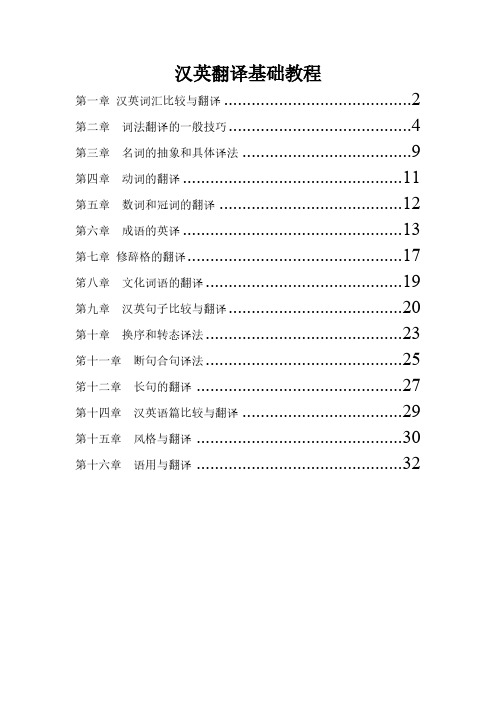
汉英翻译基础教程第一章汉英词汇比较与翻译 (2)第二章词法翻译的一般技巧 (4)第三章名词的抽象和具体译法 (9)第四章动词的翻译 (11)第五章数词和冠词的翻译 (12)第六章成语的英译 (13)第七章修辞格的翻译 (17)笫八章文化词语的翻译 (19)第九章汉英句子比较与翻译 (20)第十章换序和转态译法 (23)笫十一章断句合句译法 (25)笫十二章长句的翻译 (27)第十四章汉英语篇比较与翻译 (29)第十五章风格与翻译 (30)第十六章语用与翻译 (32)第一章汉英词汇比较与翻译第一节翻译中的选义一、结合语境选择较贴切的译文1. b2. a3. b4. a二、译出下列词语,注意词语的不同搭配1. a swarm of beesa brood of chickensa litter of pups2. a bevy of beautiful ladiesa pack of houndsa team of ducksa herd of antelopes3. unfailing supportproactive fiscal policymake effective use of overseas resources4. make a phone calltake a taxiknit a woolen sweaterfetch waterplay basketballspray insecticide5. basic wagecapital constructionessential commodityprimary industryfundamental interest三、翻译下列句子,注意画线词语的理解1. The two leaders exchanged views on bilateral relations and issues of common concern2. Party members should listen carefully to the opinions of the general public.3. They offered some suggestions for the revision of the plan.4. Everyone complained against such a practice.5. They had a dispute at the meeting.6. You should follow the doctor's advice.7. They reached a consensus on this issue.8. There is still some unfinished business to settle.9. We have consulted him about the matter.10. Please go back. There is nothing of your concern now第二节翻译中的选词一、翻译下列各句,注意词的选择和搭配。
英汉翻译基础教程练习答案总主编冯庆华

汉英翻译基础教程第一章汉英词汇比较与翻译第一节翻译中的选义一、结合语境选择较贴切的译文1. b2. a3. b4. a二、译出下列词语,注意词语的不同搭配1. a swarm of beesa brood of chickensa litter of pups2. a bevy of beautiful ladiesa pack of houndsa team of ducksa herd of antelopes3. unfailing supportproactive fiscal policymake effective use of overseas resources4. make a phone calltake a taxiknit a woolen sweaterfetch waterplay basketballspray insecticide5. basic wagecapital constructionessential commodityprimary industryfundamental interest三、翻译下列句子,注意画线词语的理解1. The two leaders exchanged views on bilateral relations and issues of common concern2. Party members should listen carefully to the opinions of the general public.3. They offered some suggestions for the revision of the plan.4. Everyone complained against such a practice.5. They had a dispute at the meeting.6. You should follow the doctor's advice.7. They reached a consensus on this issue.8. There is still some unfinished business to settle.9. We have consulted him about the matter.10. Please go back. There is nothing of your concern now第二节翻译中的选词一、翻译下列各句,注意词的选择和搭配。
Chapter 2 词法翻译技巧

二、汉语名词的转译
他的呼吸有股大蒜的味道。 His breath smells of garlic. 他是世上一切邪恶的化身。
personify vt. to be a (perfect) example of, be the living form of (some quality) 是…的化身
Father looked at him in disapproval.
我们必须广泛利用现代科学技术的新成就。 We must utilize the achievements of modern science and technology on a wide scale.
词法翻译的一般技巧 3
变名词为动词
He personified the evil that was in the world. 计算机的灵活性比较大,因此能做很多不同的工作。
Computers are more flexible, and can do a greater
variety of jobs. 就测量的精度和速度而论,似乎还没有其他的技术能
The carpets made in our company are beautiful and magnificent.
我们进行了长期不懈的努力。
We have made unremitting efforts for it.
合并译法
二、并列成分的省略
神不知,鬼不觉 取之不尽,用之不竭 攻无不克,战无不胜 主持公道,伸张正义 场场爆满,座无虚席 洗心革面,脱胎换骨 认真读书,刻苦学习 骨肉同胞,手足兄弟 精诚团结,上下一心 secretly / stealthily
新东方考研英语翻译技巧 附丁雪明完型讲义
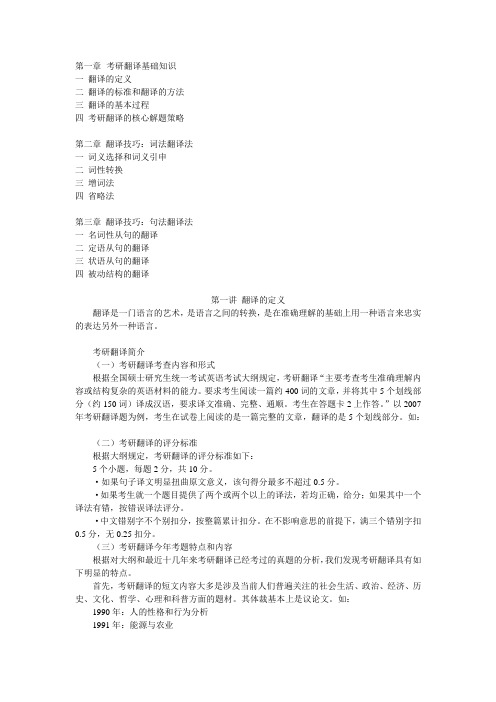
第一章考研翻译基础知识一翻译的定义二翻译的标准和翻译的方法三翻译的基本过程四考研翻译的核心解题策略第二章翻译技巧:词法翻译法一词义选择和词义引申二词性转换三增词法四省略法第三章翻译技巧:句法翻译法一名词性从句的翻译二定语从句的翻译三状语从句的翻译四被动结构的翻译第一讲翻译的定义翻译是一门语言的艺术,是语言之间的转换,是在准确理解的基础上用一种语言来忠实的表达另外一种语言。
考研翻译简介(一)考研翻译考查内容和形式根据全国硕士研究生统一考试英语考试大纲规定,考研翻译“主要考查考生准确理解内容或结构复杂的英语材料的能力。
要求考生阅读一篇约400词的文章,并将其中5个划线部分(约150词)译成汉语,要求译文准确、完整、通顺。
考生在答题卡2上作答。
”以2007年考研翻译题为例,考生在试卷上阅读的是一篇完整的文章,翻译的是5个划线部分。
如:(二)考研翻译的评分标准根据大纲规定,考研翻译的评分标准如下:5个小题,每题2分,共10分。
·如果句子译文明显扭曲原文意义,该句得分最多不超过0.5分。
·如果考生就一个题目提供了两个或两个以上的译法,若均正确,给分;如果其中一个译法有错,按错误译法评分。
·中文错别字不个别扣分,按整篇累计扣分。
在不影响意思的前提下,满三个错别字扣0.5分,无0.25扣分。
(三)考研翻译今年考题特点和内容根据对大纲和最近十几年来考研翻译已经考过的真题的分析,我们发现考研翻译具有如下明显的特点。
首先,考研翻译的短文内容大多是涉及当前人们普遍关注的社会生活、政治、经济、历史、文化、哲学、心理和科普方面的题材。
其体裁基本上是议论文。
如:1990年:人的性格和行为分析1991年:能源与农业1992年:智力评估的科学性1993年:科学研究的方法1994年:科学家、技术与科学发展的关系1995年:标准化测试与评估1996年:科学发展的差别和动力1997年:动物的权利1998年:天体物理学中的大爆炸理论1999年:历史研究的方法论2000年:政府调控与工业化发展2001年:计算机与未来生活2002年:行为科学的发展2003年:人类学的发展2004年:语言学2005年:传媒领域中的电视媒介2006年:美国知识分子的作用2007年:法学在新闻报道中的作用。
英译汉讲稿07词法翻译
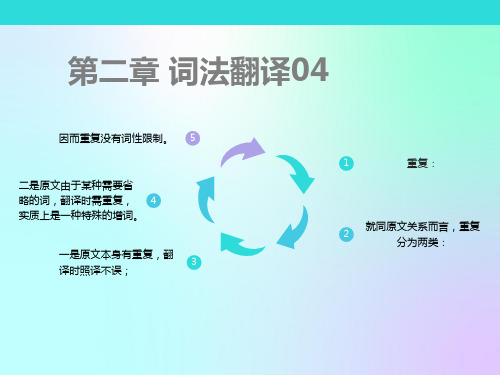
这是1940年6月4日,丘吉尔就过去一周内(5月27日到6月4日)盟军敦刻尔克大撤退取得成功向议会所做报告中的一段。此句前面的话为:
Even though large tracts of Europe and many old and famous states have fallen or may fall into the grip of Gestapo and all the odious apparatus of Nazi rule, we shall not flag or fail.
4
谁触犯了法律,谁就应受到制裁。
5
(违法必究)
She was proficient both as a singer and as a dancer.
We talked of ourselves, of our prospects, of the journey, of the weather, of each other—of everything but our host and hostess.
B.原文省略,译文重复:
John is your friend as much as mine.
01
约翰是你的朋友,同样是我的朋友。
02
But we still have defect, and very big ones.
03
但我们还是有缺点的,而且是很大的缺点。
04
Jesse opened his eyes. They were filled with tears.
1
2
The world will little note nor long remember what we say here, but it can never forget what they did here. It is for us, the living, rather, to be dedicated here to the unfinished work which they who fought here have thus far so nobly advanced.
- 1、下载文档前请自行甄别文档内容的完整性,平台不提供额外的编辑、内容补充、找答案等附加服务。
- 2、"仅部分预览"的文档,不可在线预览部分如存在完整性等问题,可反馈申请退款(可完整预览的文档不适用该条件!)。
- 3、如文档侵犯您的权益,请联系客服反馈,我们会尽快为您处理(人工客服工作时间:9:00-18:30)。
一、词的选择和意义引申考研翻译的过程和核心解题策略一、理解应以原文,拆分语法结构二、改变原文顺序,组合汉语译文词义选择和词义引申词义的选择和词义引申是考研翻译中最常用的翻译技巧。
1.在1994年72)题a leader of the new school contends 中,school 是“学派”的意思,而不是“学校”的意思;2.在1996年74)题elegant system 中,elegent是“完美,完善”的意思,而不是“优雅”的意思;3.在2001年75)题And home appliances will become so smart that ...中,smart 是“智能化”的意思,而不是“聪明”的意思;4.在2003年75)题like the concept of set in mathematics 中,set 是“集,集合”,而不是“一套,放置”等意思;5.在2004年62)题we are obliged to them 中,obliged是“感谢,感激”,而不是“被迫”的意思。
词义的选择例1.I’ll see her home tonight.今晚我送她回家。
例2. India is the home of elephants.印度是大象的生长地。
例3.He’s at home with the classics.他精通古典文学。
例4.New homes are for sale.新房出售。
例5.She’s at home where she is.她在哪儿都自由自在。
例6.Maternity homr costs in America have gone up sharply.美国妇产医院收费已经急剧上涨。
例7.Much is produced here for home market.这里为国内市场生产了许多产品。
例8.He looks on London as his home.他把伦敦看成是他的故乡。
在翻译时,词义的选择应从以下几个方面着手:(一)根据词性确定词义forecast有“预报,预测”的意思,用作动词和用作名词时意思相同。
increase作动词时,表示“增加,增长,增进”的意思,用作名词时主要还是这些意思。
book 这个单词,在作名词时,意思是“书,书籍”;用作动词却表示“预定,预约”的意思。
While作连词时,有“当...的时候,而,虽然”等意思;作名词时,却指“片刻,一会儿”;作动词,又有“消磨”的意思。
遇到这种情况,如果不弄清楚词性,常常就会将词义搞错,进而影响原文的正确理解和准确翻译。
因此在翻译中,我们可以根据语法关系来辨别关键词的词性,以便能准确的判断词义。
(二)根据上下文确定词义我们以动词move为例,如果上下文不一样,move的意思显然也是不一样,必须依据上下文才能做到准确通顺的翻译。
例1.That car was really moving .那汽车跑起来可真快。
例2. Share prices moved ahead today .股票价格今日上扬。
例3.The story of thire sufferings moved us deeply .他们的苦难经历深深打动了我们。
例4.Work on the new building is moving quickly.新大楼的工程进展得很快。
例5. The government’s opinians on this matter haven’t moved .政府对这件事的看法没有改变。
例6.I move that we support the introduction of his new technological process .我提议我们支持采用这一新工艺方法。
例7.She moves in the highest circles of society .她生活在高级社交圈里。
例8. Unless the employers move quickly ,there will be strike .雇主若不尽快采取措施,就要引起一场罢工。
(三)根据汉语习惯搭配确定词义deep: a deep well 是指深井;a deep voice低沉的嗓音;a deep red 鲜红色;deep in study 专心学习;a deep mystery难以理解的奥秒;a deep thinker知识渊博的思想家;a deep outrage 强烈的愤怒。
又如动词work在翻译时如果上下文不同,汉语习惯搭配也不一样,翻译时应该选择不同的词义表达。
例1.I think your suggestion will work .我想你的建议行得通。
例2.The new treatment wroks like magic .新疗法疗效神奇。
例3.My watch doesn’t work .我的表不走了。
例4.The sea works high .浪涛汹涌起伏。
例5.She worked her way to the front .她好不容易才挤到前面。
例6.The root of the pine tree worked down between the stones .松树的树根在石缝间扎下去。
例7.The new regulation is working well .新规定执行得很顺利。
词义的引申(一)通过抽象化加以引申例1.The have their smiles and tears .他们有自己的欢乐和悲哀。
(原文中的smiles and tears 本来是“微笑和眼泪”,但是可以引申为抽象的“欢乐和悲哀”。
)例2.We insist that international trade should not be a one-way street.我们坚持主张国际贸易不应是有来无往。
(在原文中,本意为“单行道”,将“单行道”与国际贸易联系在一起,便不难引申为“有来无往”这一含义。
)例3.I have no head for mathematics .我没有数学方面的天赋。
(原文中的head本来是“头脑”的意思,但是可以引申为“对数学没有天赋”。
)(二)通过具体化加以引申例1.Perhaps the only trouble with copper is that ot is not hard enough for some uses .就某些用途来说,铜的唯一缺点也许是硬度不够。
(原文的trouble本来是“麻烦”的意思,但是与“铜”联系在一起,就可以引申为“缺点”来翻译了。
)例2.The car in front of me stopped ,and I missed the green .我前面的车停住了,我错过了绿灯。
(在原文中,green本来就是“绿色”的意思,但是根据上下文,可以引申为具体的事物:“绿灯”。
)必须从原文固有的基本含义出发。
二、词性的转换强调词性的概念在翻译时可能会造成译者的障碍一. 转译成动词例1.I admire your decision to fight for the difficulties in preparing the examination .译文:你决定战胜复习考试中的困难,这一点我很羡慕。
(一)名称转译成动词1. 由动词派生的名词转译成动词。
例1.Rockets have found application for the exploration of the universe .火箭已经用来探索宇宙。
例2. In China ,there is a lot of emphasis on politeness .在中国,人们非常注重讲礼貌。
2. 含有动词意味的名词往往可以转译成动词。
例1. A careful study of the original text will give you a better translation .仔细研究原文,你会翻译得更好。
3. 英语中有些加后缀-er的名词.例1.He is a goog singer他唱歌唱得很好。
4. 有些短语中作为中心主体词的名词往往可以转译成动词。
To have a rest和To have a good look at 里的rest 和look .例1.You must be tired .Why don’t take a rest ?你一定很累了,为什么不休息一会呢?例1. I am anxious about his health.我担心他的身体健康。
例2. Scientists are confident that all matter is indestructible .科学家们都深信,所有的物质都是不灭的。
常见的有:与思维和直觉相关的形容词:aware ,conscious ,certain ,sure ,mindful ,ignorant ,alert 等;与感情相关的形容词:glad ,pleased ,cautious ,careful ,angry ,happy ,exhilarated ,excited , confident ,thankful ,grateful ,concerned ,eager ,afraid ,doubtful ,sorry 等;与欲望相关的形容词:desirous ,hopeful ,anxious ,keen ,enthusiastic ,zealous等。
(三)副词转译成动词例1. She opened the window to let fresh air in .她把窗子打开,让新鲜空气进来。
例2. After careful investigation they found design behind .经过仔细研究之后,他们发现这个设计落后了。
二.转译成名词(一)英语中很多由名词派生的动词,以及由名词转用的动词,在汉语中往往不易找到相应的动词,这时可将其转译成汉语名词。
1.名词派生的动词。
例1. This kind of behavior characterizes the criminal mind .这种举止是罪犯的心理特征。
例2. To them ,he personified the absolute power .在他们看来,他就是绝对权威的化身。
2.名词转用的动词例1. Our age is witnessing a profound political chage .我们的时代是深刻政治变革的见证。
例2. Most U.S. spy satellites are designed to burn up in the earth’s atmosphere after completing their missions .美国绝大多数间谍卫星,按其设计,是在完成使命后,在大气层中焚毁。
